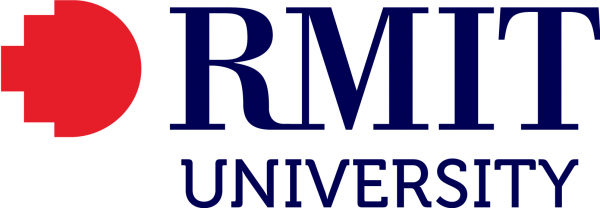Bachelor of Applied Science (Aviation) - Sep 2026 Intake
PT: Min. 16 months
Introduction
The aviation industry is vibrant and dynamic. Through this programme, you'll gain a broad awareness of the aviation industry and a range of analytical skills, giving you a comprehensive appreciation of an all-rounded aviation operation management.
Programme Features
Leader in aviation education
RMIT University has been involved in aviation education for over 75 years. Its history in aerospace and aviation education is trusted by the industry. RMIT University is ranked 6th in Australia in “Engineering – Mechanical, Aeronautical & Manufacturing” (QS Rankings by Subject 2025).
Industry-focused study
Most of RMIT and SHAPE teaching staff have rich industry experience and will share invaluable industry insights with you. Together with project-based and work-integrated learning, you will be graduated with knowledge and skillsets essential for you to overcome the upcoming challenges in the aviation industry.
Flexible study schedule
The class schedule is designed to suit the needs of students who work at shifts in the aviation industry. You only need to attend face-to-face classes on campus for 1 to 3 courses in each teaching week for the trimester. A few courses delivered by RMIT Fly-In academics will require you to attend on-campus intensive classes spreading over in 2 teaching weeks.
Courses^
The Bachelor of Applied Science (Aviation) delivered in collaboration between RMIT University and SHAPE is a top-up degree programme for students holding a relevant HD/AD qualification. Depending on your previous qualification, students will enter the programme with a credit transfer between 144 to 192 credit points from the full 288 credit points required for programme completion.
Each academic year consists of 3 trimesters and delivery is in full-time and part-time modes. Students will normally take 2 or 4 courses per trimester to complete the programme in 3-6 trimesters, dependent on the amount of credit points received and number of courses undertaken in each trimester. The programme is delivered through a combination of face-to-face lectures and tutorials / workshops and online components taught by both RMIT and SHAPE staff.
Students enrolled in the programme will need to complete between 8 to 12 courses from the following list, depending on the number of credits received:
- Airport Planning and Management (CEF Module)
-
 (CEF Code: 36Z121516)
(CEF Code: 36Z121516)The aim of this course is to provide rich information that allows you to gain knowledge of the various facets of airport planning and management. The aim is for you to understand the how and why of airports, and the role of the airport managers in the management activities, economics, financing and operating of medium, large, or hub airports. Short case studies and practical exercises oriented to the airport industry will be used to demonstrate particular features. Topics and assignments will also serve to enhance and test the depth of understanding for airport planning and management.
- Aviation Strategy in Global Context (CEF Module)
-
 (CEF Code: 36Z121524)
(CEF Code: 36Z121524) This course focuses on the strategic role of the manager, emphasising insights relating to the process of strategy development. You will learn to develop skills in influencing an organisation to achieve its goals or mission.
- Airline Operations (CEF Module)
-
 (CEF Code: 36Z121508)
(CEF Code: 36Z121508) This course provides an overview of the fundamentals of airline operational strategy. You will examine the various types of airline route structures, in particular hub-and-spoke and point-to-point networks. Based on airline network strategy, fleet planning is also investigated. The airline as a product will be explored including product design and alliance strategies. The importance of fuel on airline operations will be evaluated in terms of its economic impact, and special consideration will be given to fuel conservation. All of these aspects will then be encapsulated in the context of air fare structures and their distribution and yield management and their importance for airline operations.
- Managing the Air Traffic Environment
-
 (CEF Code: 36Z159955)
(CEF Code: 36Z159955) The course introduces you to the major players and their roles that comprise the global air transport system. Through air traffic control (ATC) and related services, Air traffic Management (ATM) provides the connecting infrastructure that allows aircraft to fly safely between airports. Through managing the separation of aircraft and air traffic flows, ATM provides services that are essential for safe and efficient air transport. Apart from this, the course will also explore the National Airways System more broadly, discussing the effects of weather, in flight emergencies, aeronautical publications, airspace management across Air Navigation Service providers and the cultural aspects of safety in such an environment. Whether you aspire to be a pilot or an aviation manager, an understanding of how the system works and its interdependence with airlines and airports is vital.
- Aviation Industry Environment
-
This course introduces you to the four distinct broad environments which include regulation, operational, economic and international issues. It is primarily focussed on the common carrier system of air transportation, that is, commercial air services offered to the public. The knowledge and skills developed through this course will support courses later in this program in relation to airline operations and airport operations, aircraft maintenance and other courses.
- Human Factors in Aviation
-
Humans are an integral part to the safety of aviation. "Human Factors" is a contributing factor in almost all aircraft accidents and is reported to be the major causal factor in three out of every four. It is therefore crucial to gain an understanding of what Human Factors are, and how aviation operations can be managed effectively, with due recognition of the impact of Human Factors to create a safe operating environment. This course also introduces the principles and application of Human Factors. Human Factors is a diverse discipline in aviation safety management that is fast being recognised as one of the most important risk areas that can contribute positively and negatively to an organisation’s success in the industry. The course introduces you to human factors, the psychological and physiological factors that influence human performance, human error, ergonomics, and various strategies to manage human factors associated with all aspects of the aviation industry. This course will enable you to identify, assess, and develop strategies to manage the impact human factors have on the safety of aviation operations. Learning is achieved through lectures, in-class discussion, real world case-studies, and assessment.
- Airport /Airline Operations
-
In this course you will study the broad range of practical operational issues that airports contend with on a daily basis. Airport/Airline Operations cover both airside operations (mainly for airlines) and landside operations (mainly for passengers). To consider some of the complexities of airport in the context of operational and commercial environments, Airport-Airline relationship, ground handling, passenger handling, baggage handling, apron operations, catering, freight handling, Air Traffic Control, airport technical services, and airport rescue and safety are studied. At the completion of this subject, you will have developed an understanding of both airside and landside operations at contemporary airports.
- Aircraft Maintenance Management
-
This course covers the vocabulary, practice and technologies of aircraft maintenance management. The course considers both system- and process-oriented perspectives on aircraft maintenance management. It addresses the key elements of the aircraft maintenance system, as embedded in the aviation regulatory framework in which continuing airworthiness and aircraft maintenance is managed. Furthermore, the course highlights and details the key stages of maintenance program development, planning, prediction, scheduling, execution and control. As part of this, contributing theories and methods from diverse areas such as human factors, structural and system integrity as well as materials science contribute to form a comprehensive understanding of contemporary aircraft maintenance management.
- Aviation Safety and Security Systems
-
This course is intended to provide you with an understanding of safety management systems (SMS) by addressing the fundamental components stipulated in the ICAO framework. You will be provided an insight of key areas which are relevant for the implementation of a safety program in the context of small and large organizations in the aviation sector, including Risk Management, Human Factors, Security, Safety Culture and Investigation/Auditing techniques. The course goes beyond a business/ quality management system as it is also focused on how people contribute to the safety performance of an organisation. The final part of this course will also cover the technical aspects impacting aviation safety, particularly the contribution of aircraft/airport safety systems to the mitigation of risks inherent to flight operations.
- Air Cargo Management and Operations
-
This course introduces you to the international air cargo mode. You will learn about the economics underpinning air cargo operations, the regulatory environment as it relates to the international air cargo mode, the roles of the air cargo mode in global supply chains, the air cargo services offered to the public, the rationale for and the forms of strategic partnerships and alliances employed in the air cargo industry, and the strategies employed by the various key stakeholders. The course also introduces you to the technical characteristics of aircraft as they relate to the air cargo mode, in particular, cargo capacity and air cargo revenue management, and ground and terminal handling requirements of air cargo.
- Aviation Industry Project
-
This course is the capstone research project in the undergraduate aviation program. The research project requires you to demonstrate technical skills as well as professional and personal attributes at a level that is commensurate with professional practice. In this course you are introduced to relevant research methodologies, how to plan a research project, how to conduct a critical review of relevant published material, and how to write and present research findings. Through your independent research project, you should gather suitable data for analysis to a suitable standard, and present your findings to your peers, academic supervisors, and industry representatives when possible. This research project is either done in conjunction with industry or simulates a real world work environment, thereby contributing to Work Integrated Learning. You will receive supervision from an internal RMIT and/or partner academic supervisor and you may also have an external supervisor (such as an industry-based practitioner). As appropriate to the level of professionalism that is required in this course, you are expected to perform your project work with a high degree of independence and with only limited guidance from staff and/or external industry supervisors.
- Unmanned Aerial Systems and Operations (Elective)
-
This course provides you with an overview on Unmanned Aerial Systems (UAS) and how they are operated in the segregated airspace. Both Line of Sight (LOS) and Beyond Line of Sight (BLOS) operations are explored. The regulatory requirements are also explored to allow for safe operation and integration into the available airspace.
- Aviation Professional Experience (Elective)
-
This course includes a Work Integrated Learning experience in which your knowledge and skills will be applied and assessed in a real workplace context and where feedback from industry is integral to your experience. You will participate in pre- and post-placement workshops at RMIT and write a logbook during your placement that will be reviewed by your RMIT supervisor. Pre-placement workshop will help develop your skills to find work and be successful in the workplace. Logbook will help you reflect on your success and challenges in the workplace, and learn from your experience. Post-placement workshop will help you reflect on your placement and identify evidence of your skills that will enhance your future job seeking. It is your task to find your work placement position. This task helps you develop a critical career skill: to look for suitable roles and perform well in the application process.
You will work for at least 10 weeks full time (or 50 days in several blocks or approximately 370 hours part time) in industry, under the supervision of a qualified aviation practitioner, undertaking aviation work, to develop industry relevant skills, knowledge, and attributes. Aviation Professional Experience is normally undertaken in the summer vacation between the penultimate and final year of study, but can be undertaken earlier.
![]() For part-time mode only. This course has been included in the list of reimbursable courses under Continuing Education Fund. The mother course (Bachelor of Applied Science (Aviation)) of this module is recognised under the Qualifications Framework (QF Level 5).
For part-time mode only. This course has been included in the list of reimbursable courses under Continuing Education Fund. The mother course (Bachelor of Applied Science (Aviation)) of this module is recognised under the Qualifications Framework (QF Level 5).
Assessment^
Quiz, individual and group assignment, operational desktop exercise, project work and final examination
^Under review and subject to change.
QF Level
|
QF Level : Level 5 |
|
|
Importance of choosing a non-local top-up with QF Level 5Employment
|
|
Entry Requirements^
- Holders of VTC Higher Diplma (HD) in a relevant subject area :
-
- HD in Aircraft Maintenance Engineering
- HD in Airfreight Management and Global Logistics
- HD in Airport Operations Management
- HD in Aviation
- HD in Aviation Management and Global Logistics
- HD in Customer Services for Aviation and Passenger Transport
^Under review and subject to change.
OR
| Holders of Higher Diploma (HD) or Associate Degree (AD) or equivalent qualification in a relevant subject area awarded by a recognised institution will also be considered. |
Academic and English Proficiency Requirements
Successful completion of a 2-year Higher Diploma; OR a 2-year Associate Degree; OR at least the equivalent of a 2-year tertiary programme of at least Australian Qualifications Framework (AQF) Level 5 within the past 5 years where English is the language of instruction and assessment;
OR
Successful completion of at least the equivalent of one-year’s full-time study of a completed tertiary qualification equivalent to an Australian Diploma or higher within the past two years, where English is the language of teaching and assessment in an RMIT-recognised English-speaking country;
OR
When the above academic qualification is more than 5 years, the following English proficiency requirements will be required :
At least an overall IELTS score of 6.5 with 6.0 in each component; OR TOEFL Internet Based Test (IBT) Overall score 79 (with minimum score of 13 in Reading, 12 in Listening, 18 in Speaking and 21 in Writing); OR HKDSE score of 4 or more in English Language; OR other equivalent qualifications as listed on the RMIT website.
Fees
- Application Fee : HK$200 (No application fee before the deadline!)
- Registration Fee : HK$3,500
- Tuition Fee : Minimum HK$75,120 by 3 (FT) or 4 (PT) instalments
Scholarships
A variety of attractive scholarships are available to prospective, current and graduating SHAPE students.

 |
“The most interesting courses of the programme were “Aviation Industry Project” and “Aviation Safety and Security Systems”. These two courses combine science and technology to show me the endless possibilities of the aviation industry and help me plan my career.” Scott Wong Bachelor of Applied Science (Aviation)
|
Financial Aids
The following HKSAR Government financial assistance schemes are available to eligible students who pursue this programme at SHAPE:
For details including eligibility and subsidy amount, please refer to the hyperlink of each scheme.
* Please refer to the Programme Content section of this programme for the reimbursable courses under the CEF
Career Prospects
Graduates may choose to embark on professional careers in airline management, airline operations, airport management, airport operations, airport planning, aviation charter business, aviation consulting, and aviation regulation and safety.
Further Studies
Having been recognised at QF Level 5, this top-up degree programme meets the standard of locally-accredited bachelor's degree programmes. Upon graduation, students can pursue their further studies at Master’s degree level in Hong Kong or Overseas.
|
"Apart from learning from the lecturers who have lots of experience in the aviation industry, we also learned more about aviation operations via talks, webinars and industry visits. I had the opportunity to be an exchange student in Australia for one semester, and it was a great experience – I made new friends and continue our friendship even after I have returned to HK." Kazonia Chan
|
Student Awards
| Student | Award |
| Lai Cho Yu | HKSAR Government Outstanding Performance Scholarship 2022-23 |
| Lee Pok Man | HKSAR Government Outstanding Performance Scholarship 2021-22 |
| Wong Ken Jie, Scott | HKSAR Government Outstanding Performance Scholarship 2021-22 |
| Chan Ho Pan | HKSAR Government Endeavour Scholarship 2022-23 |
| Chew Sung Hei | HKSAR Government Endeavour Scholarship 2021-22 |
| Chen Ximing | HKSAR Government Reaching Out Award 2021-22 |
| Hong Chi Hin | HKSAR Government Outstanding Performance Scholarship 2020-21 |
| Kwok Chi Yan | HKSAR Government Outstanding Performance Scholarship 2020-21 |
| Lee Cheuk Lok | HKSAR Government Outstanding Performance Scholarship 2020-21 |
| Tam Ka Wing | HKSAR Government Outstanding Performance Scholarship 2020-21 |
| Ho Tsz Fung | HKSAR Government Reaching Out Award 2020-21 |
| Wong Wing Hong | HKSAR Government Reaching Out Award 2020-21 |
| Kwok Hiu Wai | HKSAR Government Reaching Out Award 2020-21 |
Graduation Ceremony
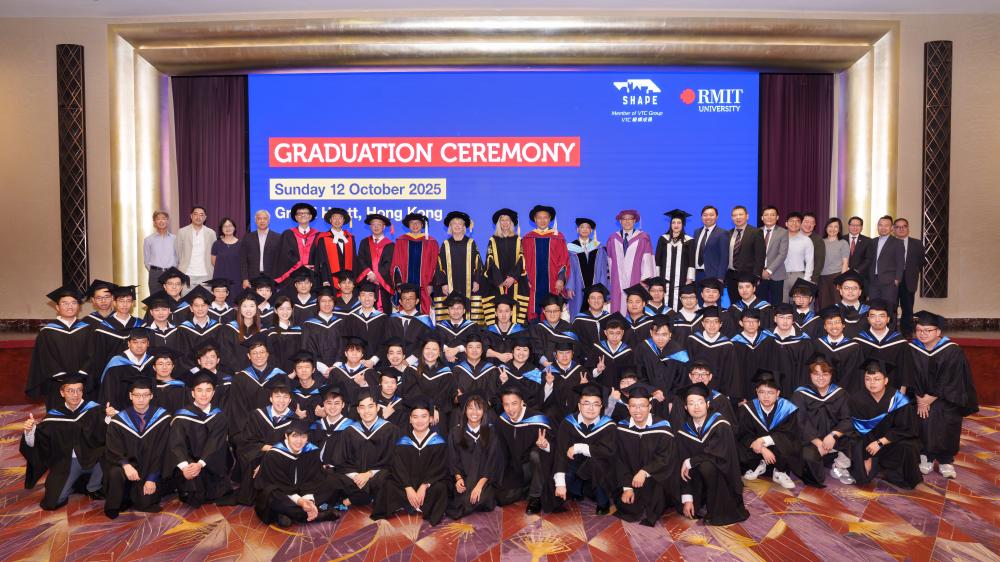
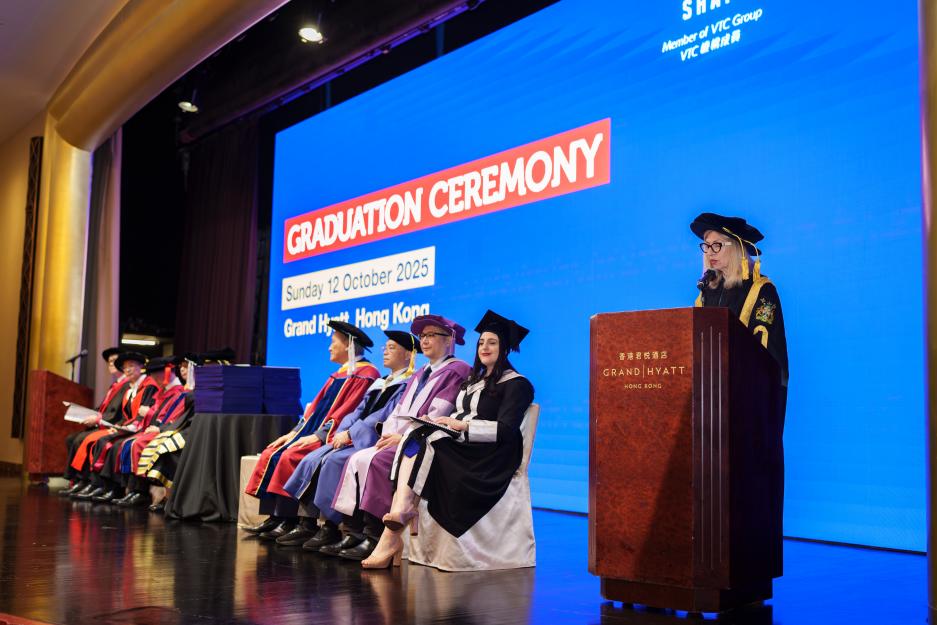
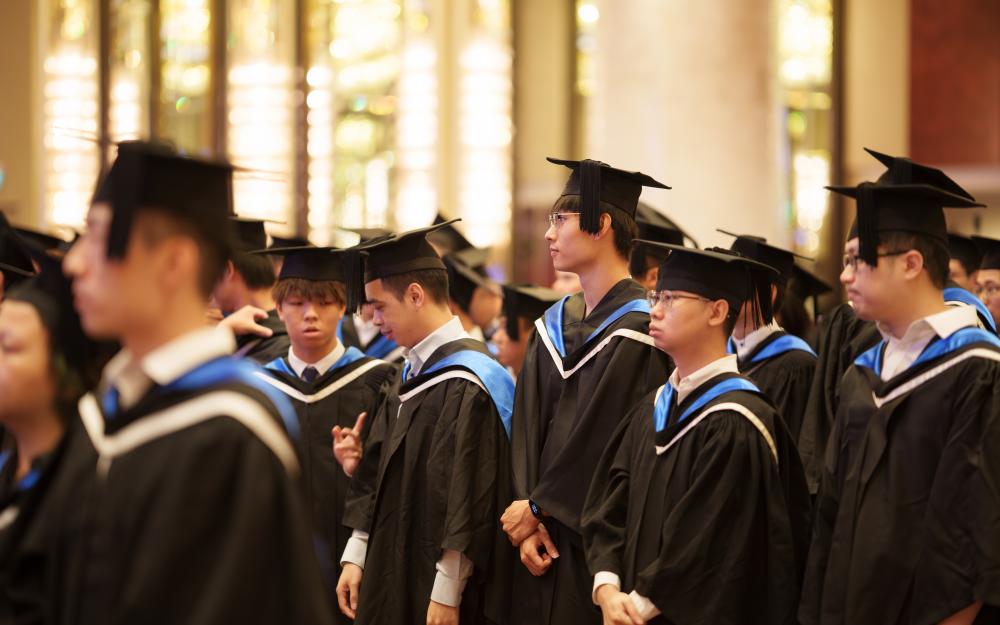
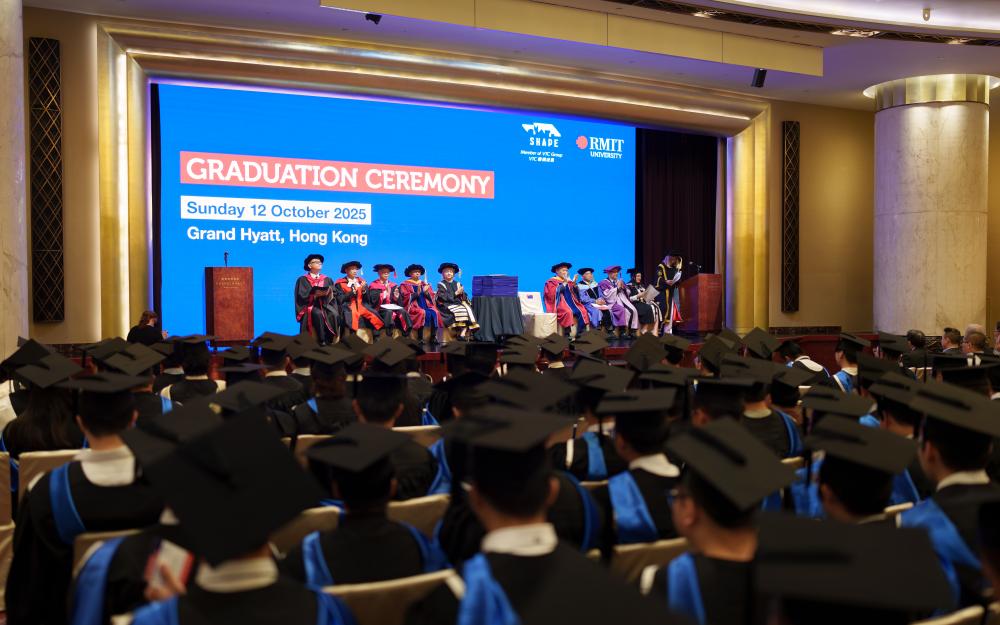
Enquiries
| Programme Coordinator | Mr. Eric Lo |
| Tel. no. | 2436 8773 |
| ericlo@vtc.edu.hk | |
| General Enquiries | Mr. Victor Leung |
| Tel. no. | 3757 9229 |
| yinvictor@vtc.edu.hk |
Connect with SHAPE Community
Connect with RMIT Community
Registration No. : 212652. It is a matter of discretion for individual employers to recognise any qualification to which this course may lead.

